
The Best Care Possible
A Physician's Quest to Transform Care Through the End of Life
ماموریت یک پزشک برای تغییر شکل مراقبت از طریق پایان زندگی
کتاب های مرتبط
- اطلاعات
- نقد و بررسی
- دیدگاه کاربران
نقد و بررسی

February 15, 2012
A lucid explanation of palliative care and how it can help people die better. "Americans are scared to death of dying," writes Byock (The Four Things That Matter Most: A Book About Living, 2004, etc.), director of Palliative Medicine at Dartmouth-Hitchcock Medical Center. Because the topic is depressing, politicians often won't talk about it. Yet the way many Americans die remains a national disgrace, and caring for the coming deluge of aging and chronically Americans will soon pose a crisis. Byock draws on decades of experience to explain how palliative care--designed not to cure but to comfort people with advanced illnesses--helps patients and their families "make the best of what is often the very worst times of life." Through the stories of patients, from a 72-year-old man with pancreatic cancer to a teenage girl with cystic fibrosis, he details the palliative approach to care, how families and health teams make difficult decisions and how improved quality of life can help patients die well. He shows how palliative physicians get to know their patients, use drugs and other interventions to alleviate pain and encourage patients to live fully and achieve postponed goals in their remaining time. One cancer patient, for instance, worked to resolve issues with his ex-wife and older children. In contrast, most critically ill individuals suffer needlessly, caught in a complex and costly health-care system that focuses on curing illnesses and fails to address personal suffering The author discusses recent research suggesting that palliative care can even help patients live longer. Once restricted to hospices, palliative care programs now exist in most hospitals with 200 beds or more, and studies show that such care can alleviate distressing symptoms among the seriously ill. Byock calls for an overhaul of national and local health-care systems to bring person- and family-centered care to people in fragile health and help them avoid all-too-frequent complications and crises. A persuasive argument for compassionate care.
COPYRIGHT(2012) Kirkus Reviews, ALL RIGHTS RESERVED.

Starred review from December 1, 2011
We all die. For most Americans, that thought is depressing and frightening. Despite technological advances in medicine (or maybe because of life-prolonging treatments), dying can be difficult: drawn-out suffering, loss of dignity, loneliness, and confinement. Dartmouth physician Byock makes a compassionate case for why people do not have to die badly. Among the doctor's many prescriptions for transforming the current system are accurately assessing and totally treating pain, avoiding actions and procedures with low likelihood of benefit but a significant possibility of augmenting patient anguish, and effectively communicating preferences for end-of-life care. The value of advance directives and the need to expand hospice services cannot be overemphasized. He identifies the need to articulate forgiveness, gratitude, and love before death occurs. He also warns of the peril of anger, a way of holding sadness at bay. Emotionally charged clinical cases, including cystic fibrosis, pancreatic cancer, dementia, HIV-AIDS, stroke, and renal failure, ignite discussion of the problems and solutions unique to the process of dying. If we aim high, the last chapter of life can be peaceful and honorable rather than frantic and awful. A good death is a sacred thing and attainable.(Reprinted with permission of Booklist, copyright 2011, American Library Association.)

























دیدگاه کاربران